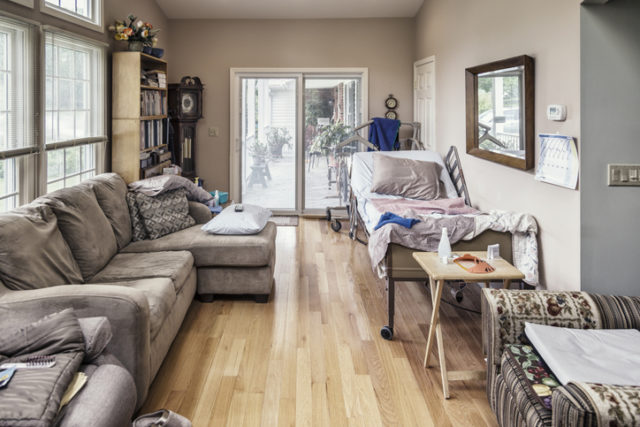
Providers and lawmakers are pushing the Centers for Medicare & Medicaid Services to extend its waiver program for acute hospital care at home. Amid this effort, they are often quick to say the care modality improves the patient experience and allows hospitals to better manage capacity so they can ensure beds are available for the sickest patients.
Citing these reasons is a vital part of the effort to secure permanent reimbursement for hospital-at-home programs, but hospital executives believe there are some lesser-discussed benefits that should be brought into the conversation as well. They dove into some of these additional benefits during a Wednesday panel hosted by the Advanced Care at Home Coalition and McDermott+Consulting.
The discussion centered on the need for Congress to pass the bipartisan Hospital Inpatient Services Modernization Act, which would extend CMS’ waiver program two years beyond the public health emergency’s expiration date. Passing the bill would not only allow hospitals to provide more care and offer patients a more comfortable healing environment, but it would also help alleviate some healthcare workers’ burnout, said Dr. Constantinos Michaelidis, the medical director of UMass Memorial Health’s hospital-at-home program.
“There have been a number of folks who have come to us and said, ‘You know, I actually was going to leave the profession because I was too burnt out, but I feel like I’ve had a rejuvenation by coming to our home hospital program,” he said.
Hospital-at-home caregivers told Dr. Michaelidis that by meeting patients and their families in their homes, they feel like a more integrated and respected part of the care team. They said “the humanity of the home” makes the care they provide feel more rewarding and less hectic.
Mae Centeno, the chief nursing officer for virtual care delivery at Texas Health Resources, said the nurses she works with have expressed similar sentiments. Nurses that were planning to retire early because of burnout have changed their minds after pivoting to at-home care, she said.
“Many nurses feel like this is a breath of fresh air,” Centeno said. “We give them an opportunity to really continue to use their skills, but do it differently.”
While home settings are certainly more relaxed than a hospital, they are also safer, according to Dr. Michael Maniaci, the medical director of Mayo Clinic Advanced Care at Home.
The flexibility to keep patients, especially those who are immunocompromised, outside of crowded hospitals was prioritized during the early months of the pandemic, but Dr. Maniaci said this option will remain an important way to protect lower-acuity patients from the possibility of hospital-acquired infections. The CDC estimates that infections acquired from U.S. hospital stays account for about 1.7 million infections and 99,000 associated deaths each year.
Dr. Maniaci highlighted another benefit of hospital-at-home: providers’ ability to see inside patients’ homes and get a better understanding of how they maintain their care plan.
“Even though it’s a virtual connection with your patient in the home setting, it’s a really intimate experience,” he said. “I get to see my patients at home in their favorite chair, with their family and their dog, in their natural environment, and we work together to figure out what’s best for them. I get to see how they care for themselves day-to-day, so I’m able to individualize the care plan.”
Dr. Maniaci and his fellow speakers contended that at-home care offers a host of benefits aside from simply allowing hospitals to treat more patients. They believe the care modality’s ability to improve patient outcomes and caregiver job satisfaction should also be heralded as the fight for permanent reimbursement continues.
Photo: Willowpix, Getty Images








